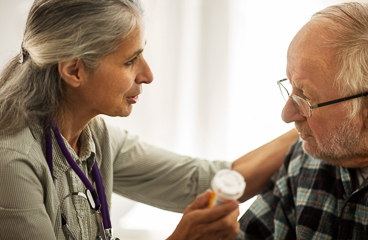
Introduction
Long-acting opioids relieve moderate to severe pain. They are also called extended-release opioids. They don't cure a health problem. They may help you manage the pain and function better.
If your short-acting pain medicine is not working, your doctor may give you long-acting opioids. Because of their increased risk of overdose and death, long-acting opioids are usually only given to patients receiving treatment for cancer or end-of-life care.
Opioids are strong medicines. They can help you manage pain when you use them the right way. But they can also cause serious harm and even death.
If you decide to take opioids, here are some things to remember.
- Keep your doctor informed. You can develop opioid use disorder. Moderate to severe opioid use disorder is sometimes called addiction. The risk is higher if you have a history of substance use. Your doctor will monitor you closely for signs of opioid use disorder and to figure out when you no longer need to take opioids.
- Make a treatment plan. The goal of your plan is to be able to function and do the things you need to do, even if you still have some pain. You might be able to manage your pain with other non-opioid options. These include cognitive behavioral therapy (CBT), physical therapy, relaxation, non-opioid prescription pain medicine, and over-the-counter pain medicines.
- Be aware of the side effects. Opioids can cause side effects, such as constipation, sleepiness, and nausea. And over time, you may need a higher dose to get pain relief. This is called tolerance. Your body also gets used to opioids. This is called physical dependence. If you suddenly stop taking them, you may have withdrawal symptoms. Serious risks of using opioids include overdose and death.
- Know the risk factors for addiction. Your risk for opioid use disorder is higher if you have a history of substance use disorder. Other things that increase the risk include being a teenager, being an older adult, having a history of mental illness, and taking high doses of opioid medicine.
Safety tips
If you need to take opioids to manage your pain, remember these safety tips.
- Follow directions carefully. It's easy to misuse opioids if you take a dose other than what's prescribed by your doctor. This can lead to accidental overdose and even death. Even sharing them with someone they weren't meant for is misuse.
- Be cautious. Opioids may affect your judgment and decision making. Do not drive or operate machinery while you take them. Talk with your doctor about when it is safe to drive.
- Reduce the risk of drug interactions. Opioids can be dangerous if you take them with alcohol or with certain drugs like sleeping pills and muscle relaxers. The combination can decrease your breathing rate and lead to overdose or death. Make sure your doctor knows about all the other medicines you take, including over-the-counter medicines. Don't start any new medicines before you talk to your doctor or pharmacist.
- Safely store and dispose of opioids. Store opioids in a safe and secure place. Make sure that pets, children, friends, and family can't get to them. When you're done using opioids, make sure to dispose of them safely and as quickly as possible. The U.S. Food and Drug Administration (FDA) recommends these disposal options.
- The best option is to take your medicine to a drop-off box or take-back program that is authorized by the U.S. Drug Enforcement Administration (DEA).
- If these programs aren't available in your area and your medicine doesn't have specific disposal instructions (such as flushing), you can throw them into your household trash if you follow the FDA's instructions. Visit fda.gov and search for "unused medicine disposal."
- If you have opioid patches (used or unused), your options are to take them to a DEA-authorized site or flush them down the toilet. Do not throw them in the trash.
- Only flush your medicine down the toilet if you can't get to a DEA-approved site or your medicine instructions state clearly to flush them.
- Reduce the risk of overdose. Opioids can be very dangerous. Protect yourself by asking your doctor about a naloxone rescue kit. It can help you—and even save your life—if you take too much of an opioid.
Possible side effects
All medicines have side effects. But many people don't feel the side effects, or they are able to deal with them. You may:
- Be constipated.
- Feel sick to your stomach or vomit.
- Feel sleepy.
- Have trouble urinating.
- Have a low sex drive.
- Need larger doses over time.
The risk of overdose and misuse is higher with long-acting opioids.
Where can you learn more?
Go to http://www.healthwise.net/patientEd
Enter O105 in the search box to learn more about "Learning About Safe Use of Long-Acting Opioids".
Current as of: July 31, 2024
Author: Ignite Healthwise, LLC Staff
Clinical Review Board
All Ignite Healthwise, LLC education is reviewed by a team that includes physicians, nurses, advanced practitioners, registered dieticians, and other healthcare professionals.

